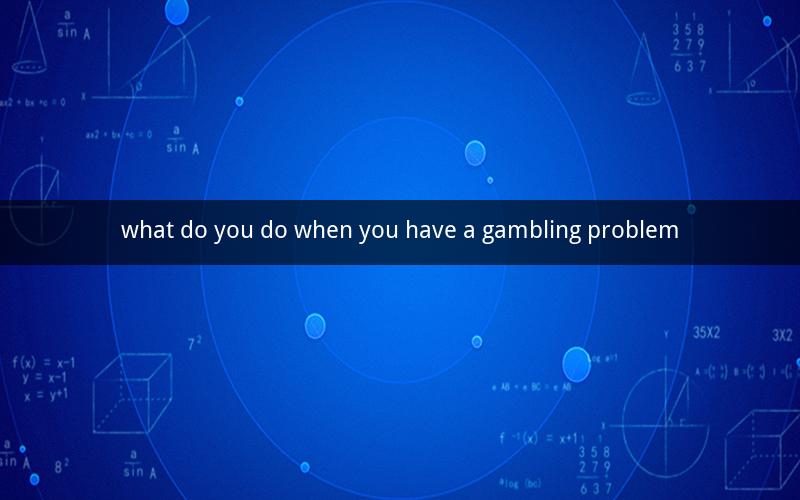
Table of Contents
1. Understanding the Problem
2. Signs and Symptoms of a Gambling Problem
3. The Psychological and Emotional Effects of Gambling
4. Impact on Personal and Professional Life
5. Seeking Help and Support
6. Treatment Options for Gambling Addiction
7. Preventing Relapse
8. Family and Friends’ Role
9. Legal and Financial Consequences
10. Conclusion
1. Understanding the Problem
Gambling is an activity that involves betting money or something of value on an event with an uncertain outcome. For many, it's a form of entertainment, but for some, it can develop into a serious problem. Recognizing when you have a gambling problem is the first step towards overcoming it.
2. Signs and Symptoms of a Gambling Problem
There are several signs and symptoms that may indicate a gambling problem. These include:
- Loss of Control: You find it difficult to control your gambling, even when you know it's causing you problems.
- Increased Time Spent Gambling: You spend more and more time gambling, and it starts to interfere with your daily activities.
- Financial Strain: You're experiencing financial difficulties as a result of your gambling.
- Emotional Distress: You may feel guilty, anxious, or depressed as a result of your gambling.
- Legal Issues: You may face legal consequences due to your gambling, such as being arrested or facing fines.
3. The Psychological and Emotional Effects of Gambling
Gambling addiction can have a significant impact on your psychological and emotional well-being. It can lead to feelings of guilt, anxiety, and depression, and may also cause you to isolate yourself from friends and family.
4. Impact on Personal and Professional Life
A gambling problem can also have a negative impact on your personal and professional life. You may struggle with financial stability, relationships, and career advancement.
5. Seeking Help and Support
If you suspect that you have a gambling problem, it's important to seek help. There are several resources available, including counseling, support groups, and treatment programs.
6. Treatment Options for Gambling Addiction
There are several treatment options available for gambling addiction, including:
- Cognitive Behavioral Therapy (CBT): CBT can help you identify and change the thoughts and behaviors that contribute to your gambling addiction.
- Motivational Interviewing: This therapy technique can help you explore your motivation for change and overcome any resistance to it.
- Support Groups: Support groups, such as Gamblers Anonymous, can provide you with a community of people who understand what you're going through.
- Inpatient or Outpatient Treatment: Inpatient treatment programs offer round-the-clock care, while outpatient programs allow you to continue living at home while receiving treatment.
7. Preventing Relapse
Preventing relapse is an important part of overcoming a gambling addiction. This can be achieved by:
- Identifying Triggers: Recognize the situations or emotions that may trigger your gambling urge.
- Developing Coping Strategies: Learn healthy ways to cope with stress and emotions.
- Maintaining a Support System: Stay connected with friends, family, and support groups.
8. Family and Friends’ Role
Family and friends can play a crucial role in supporting someone with a gambling problem. They can:
- Offer Support: Be there for your loved one, providing emotional support and encouragement.
- Educate Themselves: Learn about gambling addiction to better understand what your loved one is going through.
- Encourage Treatment: Encourage your loved one to seek help and support.
9. Legal and Financial Consequences
Gambling addiction can lead to legal and financial consequences. These may include:
- Legal Issues: Being arrested or facing fines due to gambling-related activities.
- Financial Strain: Running up debt, losing savings, and facing financial difficulties.
10. Conclusion
Overcoming a gambling problem is a challenging journey, but it's possible with the right support and resources. By recognizing the signs and symptoms of a gambling problem, seeking help, and taking steps to prevent relapse, you can take control of your life and move forward towards a healthier, more fulfilling future.
Questions and Answers
1. What are the signs and symptoms of a gambling problem?
- Signs and symptoms of a gambling problem include loss of control, increased time spent gambling, financial strain, emotional distress, and legal issues.
2. How can gambling addiction affect my personal life?
- Gambling addiction can lead to strained relationships, financial difficulties, and emotional distress.
3. What are some treatment options for gambling addiction?
- Treatment options include cognitive behavioral therapy (CBT), motivational interviewing, support groups, and inpatient or outpatient treatment programs.
4. How can family and friends support someone with a gambling problem?
- Family and friends can offer support, educate themselves about gambling addiction, and encourage treatment.
5. What are the legal and financial consequences of gambling addiction?
- Legal consequences may include arrest or fines, while financial consequences may include debt, losing savings, and financial difficulties.
6. Can gambling addiction be cured?
- While there is no cure for gambling addiction, it can be effectively managed with treatment and support.
7. How can I identify triggers for my gambling urge?
- Identifying triggers involves reflecting on the situations or emotions that typically precede your gambling urge.
8. What are some coping strategies for managing stress and emotions?
- Coping strategies include exercise, meditation, and engaging in hobbies or activities that promote relaxation and well-being.
9. Are there any support groups for people with gambling addiction?
- Yes, there are support groups such as Gamblers Anonymous, which provide a community of individuals who understand what you're going through.
10. How can I prevent relapse after overcoming a gambling addiction?
- To prevent relapse, identify triggers, develop coping strategies, maintain a support system, and continue to seek help and support as needed.